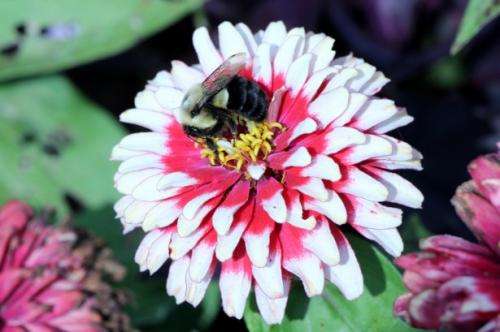Credit: Lilla Frerichs/public domain
A large-scale study published by researchers from Royal Holloway University of London has drawn together the findings of a decade of agrochemical research to confirm that pesticides used in crop protection have a significant negative impact on the learning and memory abilities of bees. Their findings are published on 11 July in the Journal of Applied Ecology.
Ph.D. student Harry Siviter, alongside Professor Julia Koricheva, Professor Mark Brown, and Dr. Elli Leadbeater (all from Royal Holloway) combined data from a large number of studies in which bees that had been exposed to pesticides had to learn about floral scents, a test that is commonly used to measure learning and memory in bees.
Their research reveals that even at very low field-realistic dosages, pesticides have significant negative effects on bee learning and memory, with worker bees exposed to pesticides less likely to learn and memorise a rewarding scent. Learning abilities are a vital component of the search for food in bees, because individuals must remember what type of flowers to visit, where to find them, which flowers they have recently drained of nectar, and how to find the way back to the hive.
Harry Siviter said: "Policy makers need robust information about the impact of insecticides on pollinators if they are to develop appropriate regulation for sustainable bee health".
"Our results show that, when combining data collected from a wide range of studies, insecticides have a significant negative impact on bee learning and memory. This occurs even at the low levels of pesticides that bees would routinely encounter in the field.
"Importantly, as the near-total European ban on neonicotinoid insecticides is set to be implemented in December this year, our results showed that non-neonicotinoid insecticides also have a robust significant negative impact on bee learning and memory.
"Our findings therefore highlight the need for policy makers and regulators to increasingly consider the sub-lethal impacts of insecticides on important pollinators such as bees."
More information: Siviter H, Koricheva J, Brown MJF, Leadbeater E. Quantifying the impact of pesticides on learning and memory in bees. J Appl Ecol. 2018;00:1-10 DOI: 10.1111/1365-2664.13193
Journal information: Journal of Applied Ecology
Provided by British Ecological Society






















